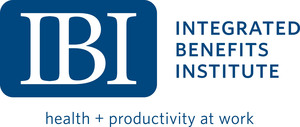Integrated Benefits Institute Study Indicates Lost-time Benefits Programs Remain Stable in Spite of Economy
IBI also releases industry's largest single-source benchmarking database to help employers manage health, disability and productivity programs
SAN FRANCISCO, Aug. 31, 2011 /PRNewswire/ -- Amid the worst economic times in decades for U.S. businesses, a new study of employers from the non-profit Integrated Benefits Institute indicates that key aspects of lost-time benefits programs have remained remarkably stable. The incidence of short- (STD) and long-term disability (LTD) programs changed little between 2008 and 2010, and durations for STD and workers' compensation temporary disability were essentially flat. Even with this stability, however, the research also shows that new and closed workers' compensation claims have declined as a share of claims inventory and that long-term disability claims continue to age on employers' books.
The research is based on IBI's industry-largest benchmarking database, also released today. The study compares 2010 claims results to 2008 and 2009 for short- and long-term disability and workers' compensation experience. To avoid confusion and misinterpretation, IBI examines the results across the same employers for all three years for this analysis.
Impact of health reform
"While there's been a great deal of discussion around the impact of health care reform and anticipated health care cost increases for employers, little has been said about the more serious threats to employer costs and business results from employee absence from work if employers opt out the health care system," said Thomas Parry, PhD, president of IBI. "Employers that opt out will eliminate their ability to work in partnership with their health plans and providers to manage the health of their workforce."
Research repeatedly has shown that the full costs of health – including absence, disability, reductions in employee performance and lost productivity – can often be greater than medical and pharmacy costs combined. Employers need to carefully consider these broader issues in decisions about exiting the health care system. "Those that continue to view medical costs in a separate and distinct program silo do so at their peril," noted Parry.
IBI benchmarking
In addition, the study examines the prevalence of medical versus Family and Medical Leave Act (FMLA) leave and continuous versus intermittent from IBI's 2010 benchmarking database. In 2010 more employees took continuous federal FMLA leaves to take care of their own medical conditions, rather than intermittent leaves or time off to care for family members.
IBI's 2010 benchmarking database contains data on more than 3 million claims for nearly 48,000 employer programs and claims experience benchmarks for more than 750 SIC (Standard Industrial Classification) groups. This benchmarking data tool is used by employers and by consultants, brokers, and by other benefits professionals to help employers assess the impact of their health and productivity programs as compared to others in their peer group.
Industry-specific benchmarking reports are available for short-term disability, long-term disability, workers' compensation and family and medical leave programs from the Institute. IBI Benefits Intelligence benchmarking program also compares results by plan design for short- and long-term disability. Employers receive access to high-level benchmarks for their industry as part of IBI membership (complimentary, one-year employer IBI memberships are available at ibiweb.org/register).
About the Integrated Benefits Institute
The Integrated Benefits Institute (IBI) provides employers and their supplier partners with resources for demonstrating the business value of health. As a pioneer, leader and nonprofit supplier of health and productivity research, measurement and benchmarking, IBI is a trusted source for benefits performance analysis, research-based approaches, and forums for information and education. IBI's programs, resources and expert member networks advance understanding about the link between – and the impact of – health-related productivity on corporate America's bottom line. For additional information visit: ibiweb.org.
Available Topic Expert(s): For information on the listed expert(s), click appropriate link.
https://profnet.prnewswire.com/Subscriber/ExpertProfile.aspx?ei=81799
SOURCE Integrated Benefits Institute
WANT YOUR COMPANY'S NEWS FEATURED ON PRNEWSWIRE.COM?
Newsrooms &
Influencers
Digital Media
Outlets
Journalists
Opted In



Share this article